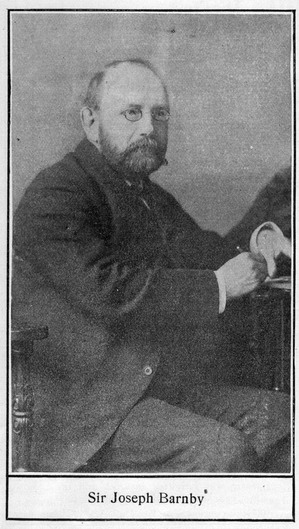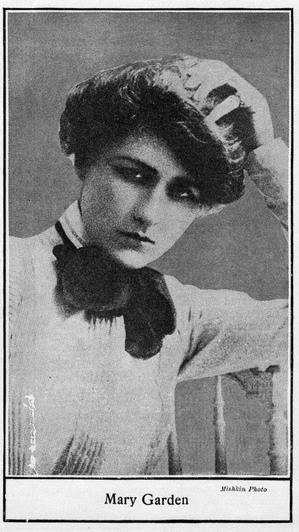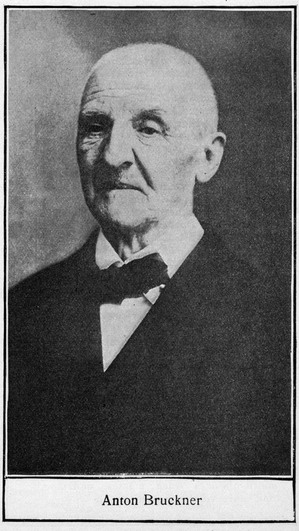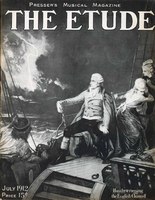Barnby was born at York, August 12, 1838, and died at London, January 28, 1896. As a boy he sang in the choir of York Cathedral, and was an organist and choirmaster at the age of twelve. After graduating at the Royal Academy of Music, he held various important church organ positions in or near London, notably at St. Andrew’s (1863-71) and St. Anne’s, Soho Square (1876-87). He was musical adviser to Novello & Co. for a number of years, and with the aid of this firm established the “Barnby Choir,” which afterwards became the present Royal Choral Society. He did great work as conductor and educator, and especially in producing the works of Bach at a time when they were less appreciated by English audiences than at present. He also conducted the first performance of Parsifal (choral version) in England in 1884. Barnby was precentor of music at Eton College, and also became director (1892) of the Guildhall School of Music. As a composer he is best known by his anthems, part-songs, hymns, etc. His setting of Tennyson’s Sweet and Low is perhaps the best known of his works. The anthem, O Lord, How Manifold, is also well known, and of the 246 hymn tunes that he wrote, Laudes Domini (When Morning Gilds the Sky) and Sarum (For All Thy Saints) are popular examples. Barnby was knighted in 1892, and the same year conducted the Cardiff Festival.
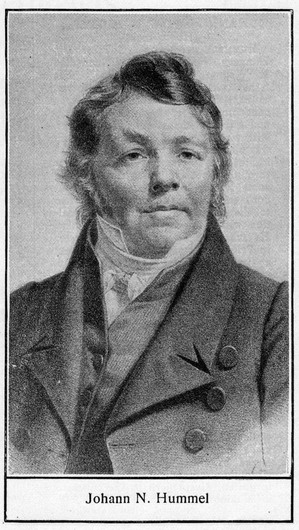 JOHANN NEPOMUK HUMMEL.
JOHANN NEPOMUK HUMMEL.
(Hoom’-mel.)
Hummel was born at Pressburg, Hungary, November 14, 1778, and died at Weimar, October 17, 1837. His father was director of the Imperial Military School of Music, and later a conductor at Vienna. In Vienna Hummel attracted the attention of Mozart, with whom he lived for a time. Haydn was also among those who saw promise in the boy. Hummel made a tour through Scotland, England (taking some lessons with Clementi in London) and Denmark, and then returned to Vienna, where he studied composition with Albrechtsberger and Salieri. He succeeded Haydn as Capellmeister to Prince Esterhazy (1804-11) and held a similar position at Stuttgart, 1816, and finally at Weimar, 1819, where he remained until his death, except for concert tours to St. Petersburg, Paris and London. He did excellent work as a teacher, his pupils including Czerny, Henselt and Thalberg. Hummel was regarded as one of the foremost musicians of his day, and his extempore playing was considered as rivaling that of Beethoven himself. He and Beethoven were friends for some time, but had a disagreement which was not settled until a short while before Beethoven’s death. Hummel’s compositions were even preferred by many people to those of Beethoven, but are now practically all forgotten, except perhaps the concerto in A minor.
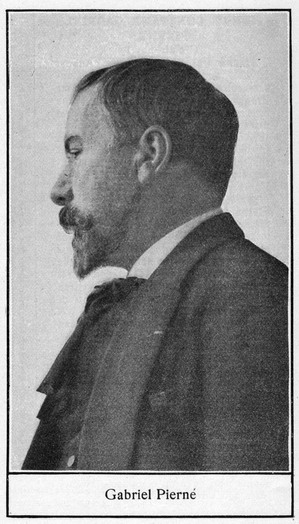 HENRY CONSTANT GABRIEL PIERNÉ.
HENRY CONSTANT GABRIEL PIERNÉ.
(Pe-air’-nay.)
Pierné was born at Metz, August 16, 1863, and studied music at the Conservatoire of Paris chiefly under César Franck and Massenet. He won the first medal for solfège in 1874, the first prize for piano in 1879, for organ in 1882 and for counterpoint and fugue in 1881. In 1882 he also carried off the highest of all honors the Conservatoire has to bestow—the Prix de Rome. He followed César Franck as organist of Sainte Clotilde in 1890. Pierné has written a number of dramatic and orchestral works of much intrinsic worth. The most famous of his larger compositions is probably his Children’s Crusade, which is one of the most important of recent French choral compositions. The work was written for the City of Paris competition of 1903, but failed to win the prize. A special prize, however, was awarded the work in the following year. Pierné’s smaller compositions have made his name familiar to all musicians, the most popular of his works being doubtless the Serenade for violin and piano. Pierné’s lighter music is very graceful and there is no wonder that it is popular. He succeeded Cotonne as conductor of the Colonne Orchestra, and has recently attracted general notice by his generous treatment of Fanelli, the composer of genius who gave up composing twenty years ago through poverty.
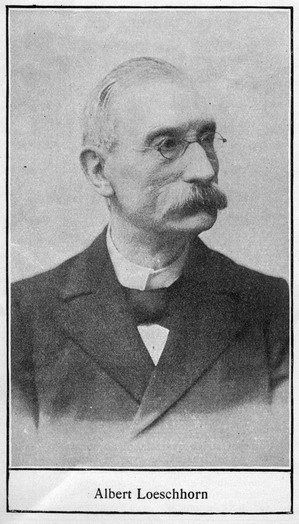 ALBERT LOESCHHORN.
ALBERT LOESCHHORN.
(Laysh’-horn.)
Loeschhorn was born in Berlin, Germany, June 27, 1819, where he died, June 4, 1905. He studied piano playing at the Royal Institute for Church Music under L. Berger, Grell and A. W. Bach. He subsequently became a teacher in the institution at which he had graduated (1851). While the greater part of his time was occupied in giving piano lessons, he also did some very useful work in organizing concerts of chamber music in Berlin. These were carried on for many years with great success. As a teacher Loeschhorn was very painstaking and thoroughly conscientious, so that many of his pupils have risen to distinction. The services he rendered to the cause of the highest ideals in music were justly recognized in 1868, when the title of Royal Professor was conferred upon him. His work as a composer was carried on mainly along pedagogical lines. Loeschhorn’s Studies are especially famous, and are in constant use among piano students. He also wrote some melodious little pieces, a good example of which can be found in his popular composition, Good Night. Apart from work of this kind, however, Loeschhorn completed some more elaborate compositions in the form of string quartets, piano sonatas, etc. Musicians of the type of Loeschhorn may not be so spectacular in their methods as the great composers and concert artists, but their influence is often far more lasting.
Mary Garden was born at Aberdeen, Scotland, February 20, 1877. She was brought to Chicago while very young, and was educated in this country. She first studied singing with Mrs. Duff, but afterwards went to Paris, where she became a pupil of Trabadello and Fugère. She made her début at the Opera Comique, 1900, in Charpentier’s Louise, and speedily became a popular favorite. She added considerably to her reputation by her performance of the part of Mélisande in Débussy’s opera, Péllèas et Mélisande, and Mary Garden is one of the few foreign opera singers really accepted by French audiences. Hammerstein secured her for the Manhattan Opera in 1908, and her success in America was immediate. Since being in this country she has appeared not only in the operas which first made her famous, but in other exacting works, such as Le Jongleur, Thais and Salome, and with conspicuous success in the title rôle of Victor Herbert’s opera Natoma. Since Hammerstein has retired from the opera field she has been engaged with the Philadelphia-Chicago Opera Company, under the management of Andreas Dippel. Mary Garden occupies a unique position on the operatic stage. The variety of tone color in her voice is largely responsible for her success in such works as Débussy’s Péllèas et Mélisande, which is an opera not of melody, but of moods.
Bruckner was born at Ansfelden (Upper Austria), September 4, 1824, and died in Vienna, October 11, 1896. His first teacher was his father, a village schoolmaster. After his father’s death he became a chorister at the institute of St. Florian, where he eventually became organist. He became organist at Linz Cathedral in 1855, and frequently journeyed to Vienna to study with Sechter and Kitzler. Bruckner succeeded Sechter as organist at the Hofkapelle, and also became professor of organ, harmony and counterpoint at the Conservatory. He became lecturer in music at the University in 1875, and in 1891 the University gave him the title of “Doctor,” honoris causa. He made journeys to France (1869) and to England (1871) and established his right to be considered one of the greatest organists of his day. It is, however, as a composer that Bruckner is best remembered, by virtue of the fact that he was hailed by the Wagnerites as an answer to the Brahmsites. In all probability Bruckner himself resented the fact that his works should be made a subject of dispute. He was much influenced by Wagner, but nevertheless was a simple-minded man of great earnestness and sincerity. He completed eight symphonies and three movements of a ninth, besides some masses, motets and other vocal compositions.


